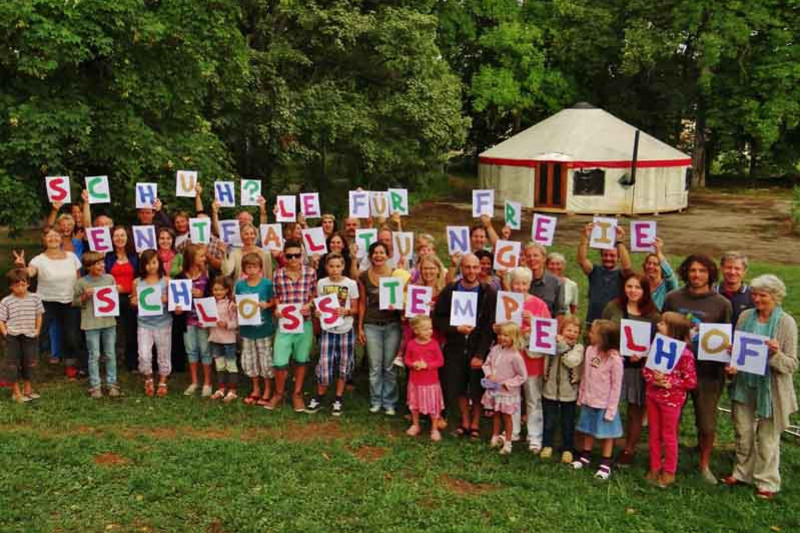Learning from Real Life

“It takes a village to raise a child” - this African proverb is taken literally in the Schloss Tempelhof community. Schloss Tempelhof, a self-governed commune located between Stuttgart and Nürnberg, has been working since 2011 to develop a school. In 2013, the first students began learning in the newly founded Schule für freie Entfaltung Schloss Tempelhof (the Schloss Tempelhof School for Free Development). The result is a place of learning that is not only accessible to children from the local community, but will surely also create new educational momentum in the region.
The school's pedagogical orientation is based on learning that is embedded in the everyday life of the community. That means that the whole village makes itself available for the students' learning. Farms and gardens, the dairy, the bakery, the village kitchen, local store, craft shops, artists' studios, musicians, IT companies, graphic designers, managers, seminar and guest services - all this and more is made available to the children and adolescents in the school as decentralized locations for learning. At each of these locations, the students have a contact person who serves as their learning facilitator. “It's simply a great opportunity for children to get to know a diversity of adult individuals who can serve as mentors while they're growing up in life,” says Dr. Marie-Luise Stiefel, member of the Board of the School Association. As a result, the focus is not on an artificially created learning environment, but on the everyday life of the community. In this context students can experience how adults engage in meaningful work on a communal basis.
“Today, children hardly have the chance any more to experience these connections - for example, when the whole village works together during the hay harvest to accomplish real and meaningful work,” said Rüdiger Bachmann. Before joining the Freie Schule Tempelhof, Bachmann founded a free school and worked there for six years as a learning facilitator and school principal. In addition to allowing the students to experience meaningful work, he says, it is essential that the learning facilitators do not only interact with the students as knowledgeable experts. “This requires a whole new leaning culture in which the teachers are themselves constantly searching,” said Bachmann.
“For us, it's about open learning,” said primary school teacher Susanne Drothler, one of the school's learning facilitators. By 'open learning' she means a form of education in which children are not made to lose their original, natural joy of learning and their interest in the world because adults have dictated to them what they have to learn, and when. The goal is to allow the students the freest development possible, supported by learning facilitators. This form of learning follows a model developed by Dr. Falko Peschel. Everyday life is seen as a place of learning - both organisationally and methodologically as well as in terms of content and social inclusion.
The pedagogical concept of the school was reviewed and approved by Professor Ulrich Klemm at the University of Augsburg in a report produced in April 2013. The report describes the project as a particularly progressive and innovative educational approach. The concept provides for a single continuous course of education for grades one through ten. The school's initiators thus sought the school board's approval not only for a primary school, but also for a Werkrealschule, one of the types of secondary school in Germany. Once approved, the school opened in September 2013. The initial intake was 21 students aged between five and 17 years.
After a first school year, the school's administrators consider the results to be very positive. “Many expected a chaotic start,” said Susanne Drothler; but the opposite was the case. This was also due to the fact that the school did not only start with the youngest classes only, but with all ages. As a result, the older students were able to take responsibility for younger ones, and a sense of community developed quickly. The students not only took responsibility for one another, but also for shaping the school culture and learning processes. “It was incredibly exciting to experience how the children and young people developed for themselves their own binding guidelines about how the school day should be designed. From the very start they had the experience of playing an active role in shaping their own educational biographies, and so they never adopted a passive, consuming posture in the first place,” Drothler explained.
At the start there were fears that open, self-directed learning would lead to wilfulness and chaos; and there was a steady stream of sceptical questions about whether the sheltered environment of a commune would adequately prepare children for “harsh reality”. “Because the children largely plan their days themselves, they are constantly engaged in realistic life processes,” Bachmann said. The educator is certain that these early, practically relevant confrontations with the ever-changing realities of daily life are better preparation for a self-responsible life in society than many other school concepts, which are based mainly on artificial learning environments.
The concept has been met with great interest, and the school is growing faster than expected. The school expects a large increase in the number of students in the coming year - and not only from the immediate local community, but also from the surrounding region.
“What we find exemplary is that the school is not just available to children in the community, but is also intended to create regional momentum,” stated Andreas Rebmann, who managed the project on behalf of the Software AG Foundation. “The school is well networked and would like to strengthen the educational landscape in this region with by offering an education for all grades that is based on reform pedagogy. They are creating new momentum for community-oriented action, which already starts with formation of the necessary skills during the school years,” said Rebmann in praise of the initiative.
